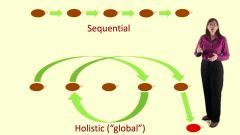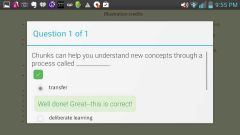![]()
![]()
![]()
Use LEFT and RIGHT arrow keys to navigate between flashcards;
Use UP and DOWN arrow keys to flip the card;
H to show hint;
A reads text to speech;
22 Cards in this Set
- Front
- Back
|
Key to Learning
|
Key to learning is forgetting what you don't need to know
|
|
|
Revision
|
Revision at regular interval with time and space can be fantastic to learning. Say no to cramming
|
|
|
Chunking
|
Chunking helps with understanding of the material and with recalling the material. Chunk is a way to compressing information much more compactly
|
|
|
The Critical Question
|
The critical question is what do I need to know?
Who am I? Where am I going? What is it that I want? How will I know that I have it? in what circumstances do I want it? |
|
|
The ability to visually construct
|
Is a mark of a master learner and creator
|
|
|
Create and articulate
|
This is one of the most important skills in learning
|
|
|
What is understanding?
|
Understanding = Knowledge + Being
|
|
|
Greatest Enemy to Learning
|
The greatest enemy to learning is tension
-Eliminate the reasons for tension - Relaxation is a conscious process - Learning should be an effortless process |
|
|
The Secret to Memory
|
The secret to memory is not in memory its in the ability to construct pictures. the secret to memory is not in memory its in the ability to construct picture.
Once you can get it into a picture then you can remember it |
|
|
The difference between recall and recognition
|
I should be able to draw upon my memory and recall. Recognition is merely context based and is not true understanding.
|
|
|
Principles of Learning and Memory
|
Principles of Learning and Memory
1. Selectivity 2. Motivation- The mind remembers when heart is engaged 3. Emotional significance 4. Meaning 5. Intend to remember 6. Basic background Contradictory information is a useful information 7. Meaningful Organization Personal organization that you impose on material is of critical importance. This converts information to knowledge. One of the great ways to organize is visually. Connect it up to what you already know. If its relevant to outcomes and we can organize it then it becomes knowledge what are the best ways to organize things is visually. There is a quote from Einstein and people ask him how he was able to have such great recall and How he was able to do some of the things he did and basically what he said in said in thithis: BasicalLy I got all of screens in front of me and I've got like mindmaps on all the screens and where everything is organized and connected and I can move the screens forward and back when I want to access something I just bring up that mind mirror and then I see if they're right in front of me and its connected to everything else so the whole sheet to the the taking and sayings insta connecting it up to what you already know so in the initial registration simply registering it sticking it in there unless its connected up to watch you already know its a limited value and it's very hard to remember. 8. Relaxation |
|
|
Three Stages of Learning
|
Stage 1: Learning. Stage 2: Learning to learn. Stage 3: Learning how to learn to learn
|
|
|
30 Second Summation
|
If you only do one thing, do this
He was in his early teens, about to start senior school, when his grandfather took him aside and told him the following: Immediately after every lecture, meeting, or any significant experience, take 30 seconds -- no more, no less -- to write down the most important points. If you always do just this, said his grandfather, and even if you only do this, with no other revision, you will be okay. He did, and he was. In everything he has done since, with such accomplishment, and with enough room still to experience life so richly. He later inducted into the pact both his sons, who have excelled in their young careers. I've been trying it out for a few months. Here's what I've found so far: It's not note taking: Don't think, just because you write down everything in a meeting, that you're excused from the 30 second summation. Though brief, this exercise is entirely different from taking notes. It's an act of interpretation, prioritisation and decision-making. It's hard work: Deciding what's most important is exhausting. It's amazing how easy it is to tell yourself you've captured everything that matters, to find excuses to avoid this brief mental sprint -- a kind of 100 metres for your brain. Detail is a trap: But precisely because we so often, ostensibly, capture everything -- and thus avoid the hard work of deciding what something counts -- that everything is worth less. So much of excellence is, of course, the art of elimination. And the 30 second review stops you using quantity as an excuse. You must act quickly: If you wait a few hours, you may recall the facts, but you lose the nuance. And this makes all the difference in deciding what matters. Whether it's the tone in someone's voice, or the way one seemingly simple suggestions sparks so many others, or the shadow of an idea in your mind triggered by a passing comment. You learn to listen better, and ask better questions: Once you get into the habit of the 30 second review, it starts to change the way you pay attention, whether listening to a talk or participating in a discussion. It's like learning to detect a simple melody amidst a cacophony of sound. And as you listen with more focus, and ask better questions which prompt actionable answers, so your 30 second review becomes more useful. You're able to help others more: Much of what makes the 30 second cut are observations about what matters to other people. Even if the purpose is to help better manage different interests in future conversations, it also helps you understand others needs, and so solve their problems. This does not surprise me: in months of interviewing people who make generous connections, I've been struck by how many have their own unconscious version of the 30 second review: focused on the question of how best they can help. It gets easier and more valuable: Each time you practice, it gets a little easier, a little more helpful and little more fun. |
|
|
The importance of recall
|
Retrieval of information induces deep understanding and is more important than repetition or concept mapping.
|
|
|
Spaced Repetiton
|
Repetition that is spaced out is much more effective than rereading
|
|
|
Testing
|
Testing yourself is a great way that you can truly recall the material And that the learning has happened
|
|
|
Why is it important to combine Chunks?
|
The ability to combine chunks in New and original ways underlies a lot of historical innovation
|
|
|
How do I (anyone) enhance knowledge and gain expertise?
|
I gradually build the number of chunks in my mind. Valuable bits of information that I can put together in new and creative ways. The bigger and more well practiced my chunked mental library, the easier I will be able to solve problems and figure out solutions
|
|
|
The Two Ways of Problem Solving
|

|
|
|
Transfer
|

|
|
|
What are the four components of Habit?
|
The Que
The routine (zombielike mode) The reward The belief |
|
|
What is a Hard-start, Jump to Easy test taking methodology?
|
Start with start, Jump to Easy as soon as you get stuck, start another hard, jump to easy. When you come back to the hard problem, you will be able to solve it quickly because of the defused mode. The easy keeps you flowing.
|

